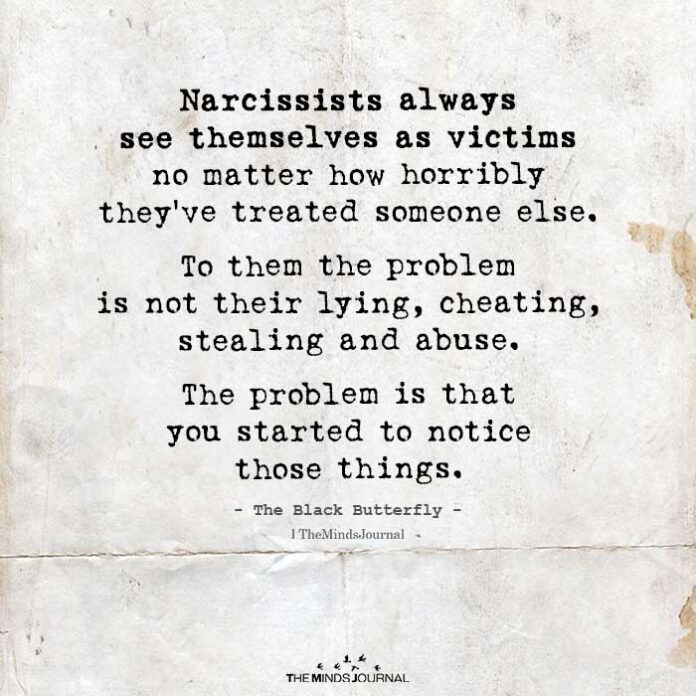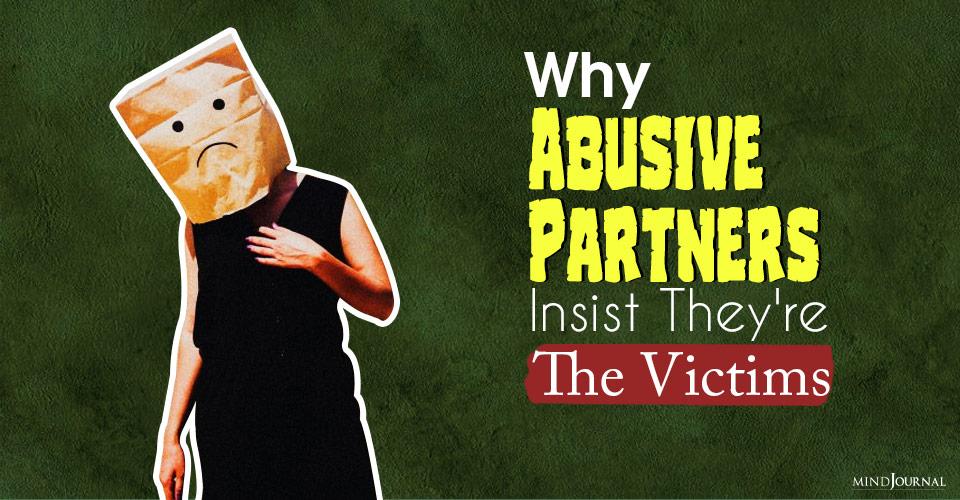Narcissistic abusive partners are the masters at twisting reality and weaving stories to make others believe that they are the victims and their partner was the actual abuser. Here is how narcissists rationalize calling their victims abusive. By Dr. Elinor Greenberg
Note: I am using the terms narcissist, narcissistic, or NPD as shorthand to describe someone who qualifies for a diagnosis of narcissistic personality disorder.
Have you ever wondered why so many narcissists devalue and humiliate their mates and then claim to be the real victim in the relationship? Some of them even accuse their non-narcissistic mate of being the real narcissist. Many of my clients report that during a fight their narcissist mate will lie and mischaracterize what is going on in an attempt to seize the high ground.
These abusive mates conveniently forget the many nasty things that they said and did during the argument and instead fixate on the one harsh thing that their abused mate said in their own defense. Following are a few examples of what I mean.
Here Are The Examples Of Narcissistic Abusive Partners
1. Carlos the Complainer:
Carlos is a very controlling and critical man with NPD. His wife Brenda, who was perfectly fine when she married Carlos, is now taking anti-anxiety medication and is thinking about starting anti-depressants as well. They have been married for five years and their marriage and Brenda’s mental health are going downhill fast. Here is how Brenda described the situation to me:
I dread getting up in the morning. I know Carlos is going to have a list of things that I did wrong or might do wrong in the future. Carlos orders me around as if I worked for him. He gives me a list of chores that he wants to be done over breakfast. When I come home after work, there is another list waiting for me and more complaints.
He is always telling me what I did wrong. I get nervous now whenever I know I will see or hear from him. I used to look forward to his texts and calls, now I dread them because I know that he will either have something nasty to say or more chores for me to do.
The crazy thing is that when I reach the end of my rope and complain about his complaining, Carlos paints himself as my victim. He can say twelve nasty things to me and if I say one single thing in my defense or finally lose my cool and just tell him to please “f*ck off and leave me alone,” he accuses me of being abusive.
He will tell everyone he knows how he had to put up with my telling him to f*ck off and I sound like a crazy shrew. He conveniently leaves out everything he has been doing for months to provoke me!
Related: Flying Monkeys: How Narcissists Use Them To Torment Their Victims
2. Walk Away Will:
Will has never learned how to give in gracefully. He is an extremely self-centered narcissist and, in his mind, everything is always someone else’s fault. So, when his girlfriend Amy made plans for them to go out with another couple, he reluctantly agreed to go. However, he was actually furious that Amy dared to plan anything without his permission.
On the way to the dinner, he acted very annoyed and walked so fast that he actually left Amy behind. This was business as usual with Will.
Whenever he was angry at Amy, he made a habit of walking too fast for Amy to keep up with him. Leaving her behind was one of the ways he punished Amy for displeasing him. When Amy complained and asked Will to slow down and walk with her, he said:
You are always picking on me. According to you, I can’t do anything right. I am going to this dinner because you wanted me to. Why isn’t that enough for you? Do you really have to criticize how I walk? I can’t believe how much crap I have to put up with from you!
In Will’s mind, Amy was 100% wrong, and he was the innocent victim being forced to go out with a couple that he did not know and then being criticized for how he walked to dinner.
3. Janet the Cheater:
My narcissistic client Janet is telling me how deeply offended she is that the man with whom she has been cheating on her husband just dumped her. Janet had just told him that she was not going to leave her husband for him. He reacted badly to this news and ended the relationship. However, in her eyes, she is his victim. Here is some of what she said to him in retaliation:
I don’t love you. I never loved you. I never intended to leave my husband for you. How dare you dump me! I expected to be the one to break it off with you. You are not even a real man. I just had sex with you because my husband is old and boring. I can’t believe you did this to me. I deserve better. I am going to get revenge on you by calling all our friends and telling them what you are doing to me. I refuse to be victimized by you!
So, what is going on? Why are these people with NPD claiming to be the real victim in the relationship when it is obvious to any impartial observer that they are quite abusive and difficult to be around?
Narcissistic Behavior And Shame
One of the ways that you can understand narcissistic personality disorder is in terms of shame avoidance. Narcissists invent a fake persona in which they present themselves to the world as perfect and always right in order to avoid feeling shame about their defects.
That is the reason that in the above examples, the narcissists are shifting the blame for their bad behavior onto their mates. They need to see themselves as totally in the right.
Related: 11 Ways Narcissists Use Shame to Control Others
Narcissists Lack Whole Object Relations
Narcissists need to portray themselves in this fake way because they lack whole object relations. Whole object relations is the technical term for the ability to form an integrated, fairly stable, and more-or-less realistic picture of themselves and other people that contains both good and bad traits.

From an object relations theoretical point of view, one of the criteria for diagnosing someone with a personality disorder is that they lack whole object relations and can only see people in a split way as either all-good or all-bad.
Most people develop whole object relations in childhood if they are treated in a fairly consistently positive way by their caregivers and still shown love even when they make mistakes. If the parents have whole object relations, the children are likely to develop this capacity.
However, if the parents do not have it, the parents will switch back and forth between loving and hating their children. This prevents the children from developing a stable sense of self. It is as if the children spend their childhood looking into two different equally distorted mirrors. One shows them as perfect and the other shows them as irredeemably flawed.
In the narcissist’s world, all-good equals perfect, special, omnipotent, and never wrong, and all-bad equals worthless, defective, and stupid. If you are all good, you are entitled to be treated as special and the usual rules do not apply to you. If you are all bad, you are entitled to nothing. You are one of life’s losers.
This extreme form of splitting creates a situation where people with NPD cannot admit to any failings without losing their ability to see themselves as all-good, perfect, and always right. Denying their flaws and shifting the blame for their mistakes is their only alternative to feeling like worthless garbage.
There is no in-between point where they can have some flaws and make a few mistakes without seeing themselves as all-bad. If they cannot avoid seeing their errors or publicly being exposed as imperfect, they are likely to fall into a shame-based, self-hating depression. In this state, they become much less functional and may even become suicidal.
The Parents Of Narcissists And Victimization
Children need to feel safe, valued, loved, and taken care of by their parents. If this is not the actual situation, many children use splitting to maintain the sense that at least one of their caretakers is a good person.
One parent becomes the designated good one and the other parent becomes the designated bad one. When the designated good parent acts mean, it is explained away as this parent’s response to being victimized by the “bad” parent.
As one of my clients said: “My mother was forced to give in to my father. She was so afraid of him that she couldn’t protect me from his beatings.” The sad reality was that this client’s mother actually shifted the blame for her mistakes onto my client so that her husband would punish him and not her.
This theme of victimization may also be acted out with siblings. One child may be the designated golden child who can do no wrong, while another child becomes the family scapegoat. When the golden child hits the scapegoated child, his behavior is explained away. The golden child is the real victim who was only protecting himself from being abused by his terrible sibling.
Related: Six Kinds of Emotional Abuse by Narcissistic Parents
Summary
If you have a narcissist in your life who is abusing you, yet often claims to be the real victim, it is usually because they learned early in life to feel that making a mistake, any mistake, makes them imperfect and invalidates any successes they have had in life. This extreme and distorted view causes them to do whatever that they can to avoid seeing themselves as the abuser.
Despite all evidence to the contrary, they will twist the truth until they can find one small “fact” that they believe justifies seeing you as the abuser and them as your innocent victim.
Written By: Elinor Greenberg Originally Appeared On: Psychology Today










Leave a Reply